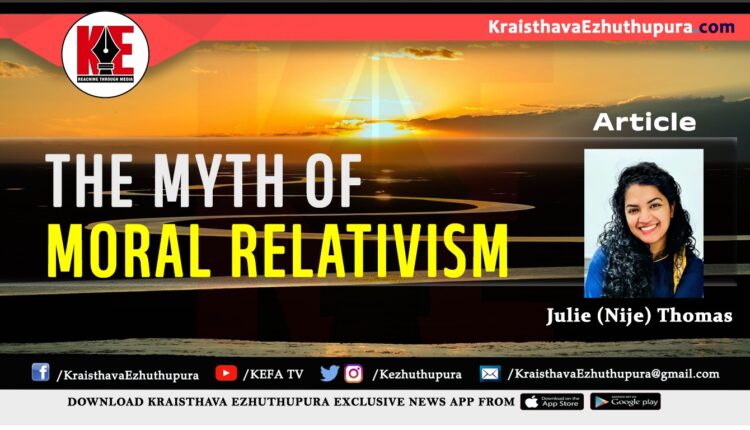Article: THE MYTH OF MORAL RELATIVISM | Julie (Nije) Thomas
Moral relativism is the rejection of absolute truth, mainly concerning personal behaviours and attitudes. It considers truth subjective, similar to beliefs and opinions that are subjective to one’s inception of things based on background or upbringing. For the moral relativist, there is no absolute system of morals. His hypothesis for life is to get what he wants, when he wants it, and how he wants it. His excuses are “there is only one life to live” and “life is too short” to deny oneself happiness. Therefore, phrases such as “just do it,” “believe in yourself,” and “if it makes you happy” have become the mantras of our society, propagating free indulgences in behaviors such as play and sex for self-fulfillment.
My first encounter with moral relativism was during my doctoral studies. As a potential doctoral candidate, we were to present the problem statement for discussion and dissection before proceeding to formulating a solution. During this exercise, our female instructor single-handedly destroyed the aspirations of every student with her brilliant arguments. Her weapon was her assertion that truth was relative and what appeared to be an issue for one person may not be an issue for another. Through her rhetoric, she persuaded the class to enter into a fantasy world void of right and wrong. She pointed us to the wide-open gate of moral relativism and enticed us to traverse the broad roads of subjective truth.
“Enter through the narrow gate. For wide is the gate, and broad is the road that leads to destruction, and many enter through it. But small is the gate and narrow the road that leads to life, and only a few find it” (John 7:13-14)
Moral relativism has long become the lifestyle of the contemporary West, gaining ground in Christain gatherings where emotional exegesis replaces scriptural absolutes. The focus of preaching has shifted from Biblical truths that condemn sin to feel-good sermons that make the sinner ‘feel welcome.’ Even so, the absolute system of truths established by God in the Scriptures remain unchanged by culture or feelings. Christ is the truth on which the Church stands and by whom men are either confirmed or condemned before God. The absolute truth expected of Christianity is the small gate and narrow roads that lead to life, which His saint must strive to enter.
Our instructor captured the students’ minds by alluring them to the endless possibilities of pursuing pleasure by the demolition of right and wrong. Like a child entering the magical world of Disney, the freedom to indulge in all sorts of entertainment was offered to us, disregarding the truth that its vanity would soon vanish. The clapper ring sounded as the students mused on moral relativism. The instructor pushed her chair back and gathered her books to make her exit. She accidentally bumped against the desk and jerked forward as she shrieked with pain. The enlightened class watched silently, and no one came forward to rescue. She struggled to gather her books and muttered curses at her spectators. Her pain was not relative, it was real. So was her suffering, as she hauled her heavy frame off the floor. Yet the moral relativism she aspired to, did not allow a helping hand or a healing heart because moral relativism makes man a monster (the class), and in moral relativism, man (the instructor) was of no worth. Moral relativism is a myth. It is a wide-open gate inviting man to broad roads that lead to his own destruction.




